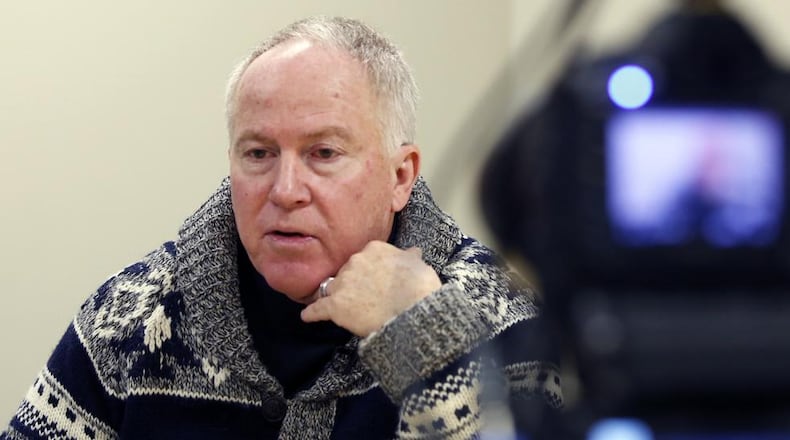The contract, and whether it stipulated that Wine was to receive 5% of new revenues he helped Wright State achieve, was the “pertinent issue,” the Ohio Court of Claims ruled.
Wine did not prove his civil claims “by the requisite degree of proof,” the court ruled last month. “The court further holds that defendant WSU (Wright State University) is entitled to a judgment in its favor.”
The Dayton Daily News previously reported that former Wright State consultant Ron Wine allegedly had what one former WSU administrator called a “handshake agreement” with WSU’s president at the time to pay Wine millions in performance bonuses for securing state and federal research contracts for the university, according to depositions in Wine’s lawsuit, a suit that sought $4.5 million from the school.
The depositions raised questions about how vigilant university representatives were in overseeing the payment arrangement between Wine and the school at a time when Wright State was facing distinct financial challenges.
In September 2016, Wine sued WSU and Wright State Research Institute, alleging that even after Wright State paid Wine $2.2 million in performance-based compensation, the university still owed $4.53 million in back compensation for $134.7 million in new revenues that Wine argued he secured for Wright State.
The court deemed Wright State the sole defendant in the case.
Some history: In 2009, the university hired Wine’s consulting firm in a bid to draw more government contracts to Wright State. His firm’s pay was $6,000 a month.
Six years later, Wine emailed then-WSU President David Hopkins, arguing that getting 5% of what he brought to WSU was not a commission, “but rather a performance based workload parameter that we informally agreed to some time ago.”
A Dayton Daily News investigation obtained WSU records showing payment arrangements with Wine that grew steadily, from $6,000 in 2009 to up to $84,000 a month.
The newspaper’s reporting led to several investigations, including a state audit released in 2019 that issued $1.3 million in findings for recovery against Wine and several WSARC administrators. Those findings are still unpaid, according to the Ohio Auditor of State’s website.
In a bench trial last June, the university argued that after it retained Wine’s services, it later “expressly ordered” him to stop his work, and it paid all invoices Wine had submitted. The university also argued that it owed Wine no additional compensation.
At trial, Dennis Andersh, who was chief executive of what was then Wright State Applied Research Corp. — now known as Parallax Advanced Research — testified that on many occasions, he asked for a copy of the university’s contract with Wine’s consulting business.
Andersh testified that he “never received a copy of it,” according to the court.
According to the court’s ruling, Wine’s testimony that he expected to be paid 5% of funds that his firm was able to secure on behalf of Wright State “lacks credibility absent a written contract ... ”
Further, the court found that even if an “implied-in-fact contract” had been formed between Wine and Wright State — one that included a 5% incentive — “a preponderance of the evidence shows that the revenues ... typically were received over the course of years.
“Under such circumstances, the purported implied-in-fact contract likely would run afoul of Ohio’s statute of frauds,” the court said.
Former WSU President Hopkins previously said under oath that he made no deal to pay Wine a performance-based bonus. He also expressed concerns that such an arrangement would have been improper, or even illegal, this newspaper has previously reported.
An agreement calling for 5% to Wine’s firm appeared nowhere in copies of Wine’s written contracts shared with this newspaper, though emails obtained by the Dayton Daily News showed Wine discussed the matter privately with senior WSU administrators over the years, the Dayton Daily News has also reported.
In a January 2016 interview with the Dayton Daily News, Wine said that WSU didn’t owe him any money and that the 5% performance-based pay wasn’t part of any written contracts. Instead, he called it a “general understanding” between himself and Hopkins and other WSU administrators.
A recording of that interview was referenced in court filings, saying in it Wine “retreated from the position that he was guaranteed a 5% performance bonus under his company’s agreement with Defendant WSU.”
A representative of Wright State declined to comment.
“We are obviously disappointed in the recent verdict of the Ohio Court of Claims and the manner in which Wright State chose to conduct its business affairs with my company,” Wine said in a written statement Monday.
“Over a seven-year period of time, they developed a complex and confusing web of contracts, subcontracts and verbal agreements that we abided by as an entrepreneurial small business while delivering outstanding results for their enterprises. I chose to trust their word and the commitment made to us by the leadership of the university to the detriment of my company and associates. It is a decision I will always deeply regret.”
Wine declined to answers questions over the phone, referring to the written statement.
About the Author

